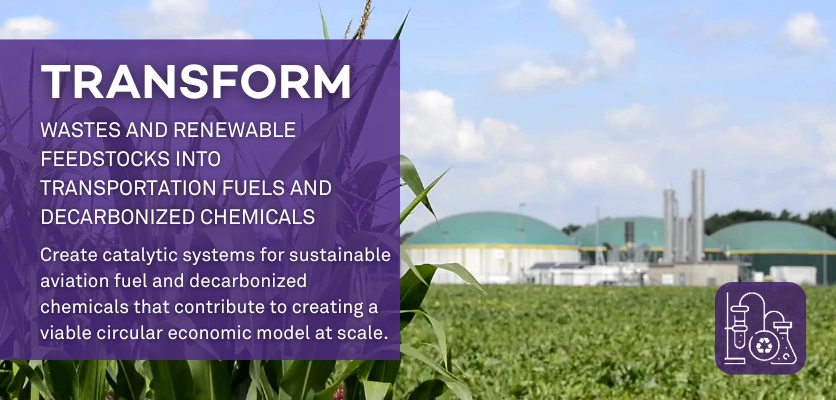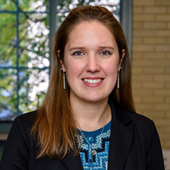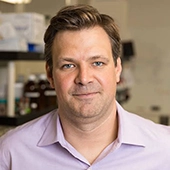The Transform Pillar
The Trienens Institute Transform pillar aims to create technologies and processes that transform wastes and renewable feedstocks into decarbonized chemicals and transportation fuels.
Research and innovation are central to the work of the Paula M. Trienens Institute for Sustainability and Energy. Together, the Trienens Institute R&D pillars are building a suite of complementary solutions for a vibrant, sustainable future. Northwestern researchers, who are global leaders in their fields, are guiding diverse teams of experts to progress in this urgent mission.

Why do we need to decarbonize fuel and chemical production?
Behind each plastic water bottle, t-shirt, and cell phone case is a series of chemical reactions and processes that become imperceptible—out-of-sight, out-of-mind—once products hit store shelves.
Equally invisible are the enormous amounts of emissions, including greenhouse gases like carbon dioxide, required to manufacture the millions of goods available to modern society. A single plastic phone case is made using a mix of chemicals, all requiring energy to extract, produce, refine, and combine into the recognizable plastic rectangle nicely packaged for buyers.
What is chemical decarbonization?
The process of decarbonizing the production of fuels and chemicals used in everyday goods means investigating the materials being used to create products as well as the energy required to make those materials with the goal of producing less waste and limiting carbon emissions.
While most chemicals and liquid fuels will always require carbon atoms, we can ensure that the materials being used are carbon-neutral or carbon-negative and result in minimal or no emissions. The new class of decarbonized chemicals and sustainable fuels will be the backbone of the decarbonized and circular economy—where waste materials are captured and reused to make something new.
Finding less carbon-intensive ways to make and work with chemicals has its challenges. Because safety is a primary concern when working with chemicals at large scale, the industry is cautious and slow to embrace experimentation and discovery. There is less of an all-hands-on-deck startup culture, but a real need for innovation and change.
The Northwestern Solution
The Transform Pillar’s goal is to transform wastes and renewable feedstocks—plant-based materials such as wood, algae, or oil—into transportation fuels and decarbonized chemicals. With nearly 100 years of experience and expertise in catalysis, Northwestern is a natural leader in ushering in the next generation of sustainable chemicals and fuels. Along the way, pillar researchers will endeavor to partner with industries to help make new technologies a reality and scale-up existing opportunities.
The Experts
Justin Notestein, Transform Pillar Co-Chair
Chair and Professor of Chemical and Biological Engineering
Justin Notestein is a full professor and Chair of Chemical and Biological Engineering at Northwestern University and is the director of the Center for Catalysis and Surface Science. He received his BSE (Princeton, 2001) and Ph.D. (UC Berkeley, 2006) in chemical engineering, followed by postdoctoral work (University of Illinois, 2006) in chemistry and materials science. Since 2007, he has mentored over 50 graduate students and postdocs in four disciplines, who have gone on to careers in academia and R&D. He is author or inventor of approximately 150 manuscripts and patents. He has held leadership roles in DOE, NSF, and industry-supported research projects.
Research in Professor Notestein’s group focuses on development and understanding of hybrid, oxide, and nanostructured catalysts that enable sustainable chemistry relevant to energy and fuels, emissions and environmental catalysis, and industrial chemical processes. Prof. Notestein has special expertise in the synthesis and characterization of oxides (including supported oxides, metal organic frameworks, and nanocrystalline oxides), especially for oxygenates and oxidative catalysis (including oxidative dehydrogenation of alkanes or alcohols, epoxidation, alkane hydroxylation, and sulfoxidation), but he has established expertise in many additional materials and reactions. His synthesis-enabled, hypothesis-driven research provides well-defined models for testing of structural hypotheses, which are complemented by the development of simple tools to interrogate kinetically-relevant structures. These are used for the rational design and development of new catalysts and reaction systems.
In the classroom, he has been added to the faculty honor roll five times, academic advisor of the year, and recipient of selective external grants on course development. Professor Notestein provides extensive service to the University and is active in the North American Catalysis Society.
Linsey Seitz, Transform Pillar Co-Chair

Assistant Professor of Chemical and Biological Engineering
Linsey Seitz joined the Chemical and Biological Engineering Department at Northwestern University in 2018. She received her B.S. (2010) in Chemical Engineering from Michigan State University, supported with a full ride scholarship. She earned her M.S. (2013) and Ph.D. (2015) in Chemical Engineering from Stanford University supported as an NSF Graduate Research Fellow and later as a Stanford DARE Fellow. Linsey completed postdoctoral research at the Karlsruhe Institute for Technology with the Institute of Photon Science and Synchrotron Radiation, supported by a Helmholtz Postdoctoral Fellowship. Her research uses tools at the interface of electrocatalysis and spectroscopy to investigate dynamic catalyst materials and reaction environments towards the sustainable production of fuels and chemicals, as well as upconversion of waste streams. Linsey was recently honored with the 2024 ACS Catalysis Early Career Award. She has received an NSF Career Award (2022), was recognized as a “Pioneer of the Catalysis and Reaction Engineering Division” of AIChE (2021), and has been named to the Northwestern University Associated Student Government Faculty Honor Roll (2022) for her outstanding mentoring.
John Torkelson

Walter P. Murphy Professor of Chemical and Biological Engineering and Materials Science and Engineering
John Torkelson earned his B.S. degree in Chemical Engineering from the University of Wisconsin, where he conducted research under Prof. James Koutsky and Prof. R. Byron (Bob) Bird. As an undergraduate and before pursuing his graduate studies, Torkelson completed internships at the Institute of Paper Chemistry in Appleton, Wisconsin, N.V. Philips Gloeilampenfabrieken in Eindhoven, the Netherlands, and the ARCO Research Laboratories in Plano, Texas. He obtained his Ph.D. in Chemical Engineering at the University of Minnesota under Prof. Matthew Tirrell. Upon completing his Ph.D., Torkelson embarked on his independent academic career at Northwestern University in 1983 as an Assistant Professor in the Department of Chemical Engineering and the Department of Materials Science and Engineering. He was promoted to Associate Professor in 1988 and to Professor in 1992. In 2002, he was appointed the Walter P. Murphy Professor of Chemical and Biological Engineering and of Materials Science and Engineering. From 1997 to 2002, Torkelson served as Associate Dean for Graduate Studies and Research in Northwestern’s McCormick School of Engineering and Applied Science. From 2003 to 2006, he was Director of Northwestern’s Materials Research Center and the NSF-MRSEC. He has also chaired the Materials Engineering & Science Division of AIChE, the Division of Polymer Physics of the APS, and the Gordon Research Conference on Polymer Physics. Torkelson has broad research interests in polymer science and engineering, recently focusing on two areas related to advancing (1) the methods and applications of polymer sustainability, particularly in developing fully reprocessable network polymers through dynamic covalent cross-links and utilizing CO2 as a reactant in polymer synthesis, and (2) the understanding and applications of polymer nanoscience and nanotechnology. His interest in polymer sustainability is unusually long-standing; his first publication on polymer recycling appeared in 1999.
Torkelson has been recognized for his excellence in teaching and research. He has received the Tau Beta Pi Outstanding Teaching Award and the Northwestern Engineering Advisor of the Year Award and has been named Engineering Teacher of the Year at Northwestern twice. Additionally, he has received the NSF-Presidential Young Investigator Award, the Wiley Polymer Physics Prize, the Charles M. Stine Award from the Materials Engineering and Science Division of AIChE, and two Best Paper Awards from the Society of Plastics Engineers Annual Technical Meeting. In 2024, ScholarGPS rated Torkelson as the #1 Highly Cited Researcher in the topic area of Transition Temperature, #3 in the topic area of Glass Transition, and #95 in the topic area of Polymers.
William Dichtel

Robert L. Letsinger Professor of Chemistry
William Dichtel received a B.S. degree in Chemistry from MIT, where he performed research with Prof. Tim Swager. Dichtel obtained his Ph.D. degree from UC-Berkeley under Prof. Jean M. J. Fréchet. He was a joint postdoctoral researcher with Prof. Fraser Stoddart, UCLA, and Prof. James Heath, Caltech. He began his independent academic career at Cornell University in 2008 and was promoted to Associate Professor in 2014. In 2016, he took sabbatical at UC-Berkeley as a Visiting Miller Professor and then moved to Northwestern University as the Robert L. Letsinger Professor of Chemistry. The unifying theme of Dichtel’s research is the use of organic synthesis to control the structure and reactivity of molecules, materials, and interfaces across chemical environments. His research has expanded the study of polymerization processes into the second and third dimensions in an emerging class of polymers known as covalent organic frameworks (COFs).
Dichtel’s research has been recognized nationally and internationally. He received the NSF CAREER Award, Beckman Young Investigator Award, ACS Cope Scholar Award, National Fresenius Award, and the IUPAC/Polymer International Award. Dichtel was also the recipient of the prestigious MacArthur Fellowship, the Doolittle Award, the Baekeland Award, the FRED Cottrell Award and the 2020 Blavatnik Award.
Current Projects
Center for Catalysis and Surface Science
Recycling Nitrogen Atoms
Faculty Jennifer Dunn, Keith Tyo, George Wells, and Justin Notestein are working to recycle nitrogen atoms in wastewater using microbes from wastewater treatment. The captured nitrogen may be turned into a valuable material for industrial use. Beyond recovering precious resources, targeting wastewater may benefit the predominantly low-income communities often situated near polluted waterbodies.
Center for Synthetic Biology
Faculty at the Center for Synthetic Biology are finding ways to create large-scale industrial chemicals like acetone and butanol using inputs like sugar and corn that are renewable and involve fewer carbon emissions. Integrating Electrocatalysis and Thermocatalysis
A collaborative project between Northwestern researchers and industrial sponsor, INVISTA, is exploring alternative processes to make nylon precursors by creating a combined electro- and thermo-catalytic reactor system to selectively oxidize alkenes to epoxides.
In the News
Dayne Swearer named to C&EN's Talented Top 12
Dayne Swearer named to C&EN's Talented Top 12 for 2025! These scientists are advancing practical solutions for plastics recycling and sustainable agriculture | FULL STORY >
Seitz Receives Camille Dreyfus Teacher-Scholar Award
Northwestern Engineering’s Linsey Seitz has been selected as one of the 19 Camille Dreyfus Teacher-Scholars for 2025 | FULL STORY >
Plastic Recycling Gets a Breath of Fresh Air
Harnessing moisture from air, Northwestern University researchers have developed a simple new method for breaking down plastic waste | FULL STORY >
Seven Northwestern professors named Sloan Research Fellows
Seven Northwestern faculty members have been awarded a prestigious 2025 Sloan Research Fellowship gifted by the Alfred P. Sloan Foundation | FULL STORY >
New catalyst could boost clean energy research
New technique provides insights on how to measure catalysts, improves materials used to develop clean energy technology | FULL STORY >
Northwestern researchers receive $750K DOE grant in sustainability and energy catalysis
Funding supports continued research in catalysis and to enhance the long-term sustainability of catalytic processes | FULL STORY > Durable plastic pollution easily, cleanly degrades with new catalyst
New catalyst breaks down nylon fishing nets, carpet, and clothing without leaving harmful byproducts behind | FULL STORY >
How can I support fuel and chemical decarbonization?
Become a scientific partner or make a gift in support of the Institute. For industry professionals and other leaders who wish to go deeper, consider corporate partnership opportunities. For broader impact, consider joining the Trienens Institute Executive Council.




